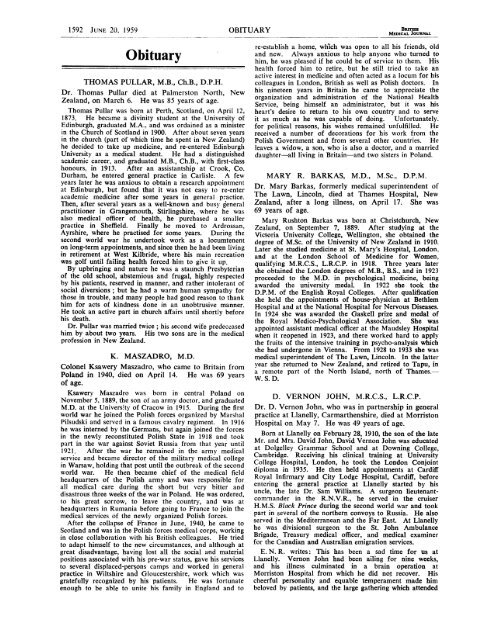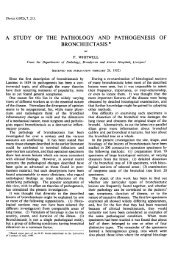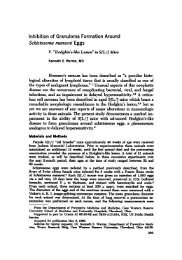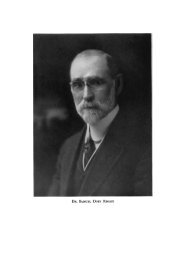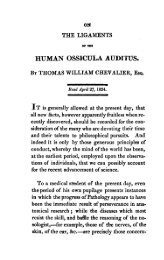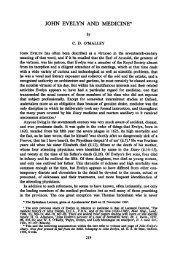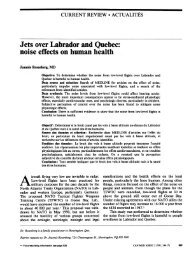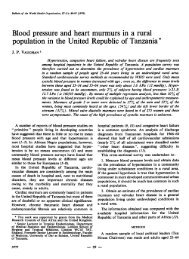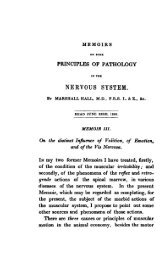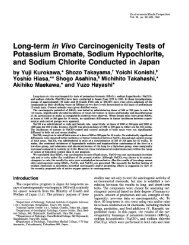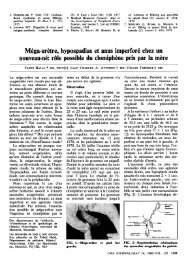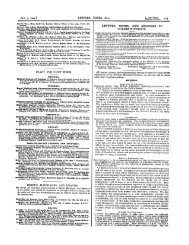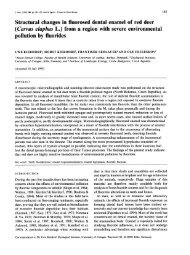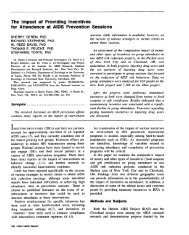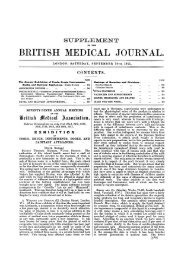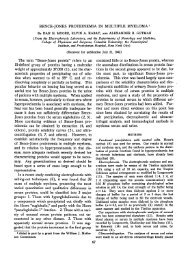You also want an ePaper? Increase the reach of your titles
YUMPU automatically turns print PDFs into web optimized ePapers that Google loves.
1592 JUNE 20, 1959<br />
Obituary<br />
<strong>THOMAS</strong> <strong>PULLAR</strong>, M.B., <strong>Ch</strong>.B., D.P.H.<br />
Dr. Thomas Pullar died at Palmerston North, New<br />
Zealand, on March 6. He was 85 years of age.<br />
Thomas Pullar was born at Perth, Scotland, on April 12,<br />
1873. He became a divinity student at the University of<br />
Edinburgh, graduated M.A., and was ordained as a minister<br />
in the <strong>Ch</strong>urch of Scotland in 1900. After about seven years<br />
in the church (part of which time he spent in New Zealand)<br />
he decided to take up medicine, and re-entered Edinburgh<br />
University as a medical student. He had a distinguished<br />
academic career, and graduated M.B., <strong>Ch</strong>.B., with first-class<br />
honours, in 1913. After an assistantship at Crook, Co.<br />
Durham, he entered general practice in Carlisle. A few<br />
years later he was anxious to obtain a research appointment<br />
at Edinburgh, but found that it was not easy to re-enter<br />
academic medicine after some years in general practice.<br />
Then, after several years as a well-known and busy general<br />
practitioner in Grangemouth, Stirlingshire, where he was<br />
also medical officer of health, he purchased a smaller<br />
practice in Sheffield. Finally he moved to Ardrossan,<br />
Ayrshire, where he practised for some years. During the<br />
second world war he undertook work as a locumtenent<br />
on long-term appointments, and since then he had been living<br />
in retirement at West Kilbride, where his main recreation<br />
was golf until failing health forced him to give it up.<br />
By upbringing and nature he was a staunch Presbyterian<br />
of the old school, abstemious and frugal, highly respected<br />
by his patients, reserved in manner, and rather intolerant of<br />
social diversions; but he had a warm human sympathy for<br />
those in trouble, and many people had good reason to thank<br />
him for acts of kindness done in an unobtrusive manner.<br />
He took an active part in church affairs until shortly before<br />
his death.<br />
Dr. Pullar was married twice; his second wife predeceased<br />
him by about two years. His two sons are in the medical<br />
profession in New Zealand.<br />
K. MASZADRO, M.D.<br />
Colonel Ksawery Maszadro, who came to Britain from<br />
Poland in 1940, died on April 14. He was 69 years<br />
of age.<br />
Ksawery Maszadro was born in central Poland on<br />
November 5, 1889, the son of an army doctor, and graduated<br />
M.D. at the University of Cracow in 1915. During the first<br />
world war he joined the Polish forces organized by Marshal<br />
Pilsudski and served in a famous cavalry regiment. In 1916<br />
he was interned by the Germans, but again joined the forces<br />
in the newly reconstituted Polish State in 1918 and took<br />
part in the war against Soviet Russia from that year until<br />
1921. After the war he remained in the army medical<br />
service and became director of the military medical college<br />
in Warsaw, holding that post until the outbreak of the second<br />
world war. He then became chief of the medical field<br />
headquarters of the Polish army and was responsible for<br />
all medical care during the short but very bitter and<br />
disastrous three weeks of the war in Poland. He was ordered,<br />
to his great sorrow, to leave the country, and was at<br />
headquarters in Rumania before going to France to join the<br />
medical services of the newly organized Polish forces.<br />
After the collapse of France in June, 1940, he came to<br />
Scotland and was in the Polish forces medical corps, working<br />
in close collaboration with his British colleagues. He tried<br />
to adapt himself to the new circumstances, and although at<br />
great disadvantage, having lost all the social and material<br />
positions associated with his pre-war status, gave his services<br />
to several displaced-persons camps and worked in general<br />
practice in Wiltshire and Gloucestershire, work which was<br />
gratefully recognized by his patients. He was fortunate<br />
enough to be able to unite his family in England and to<br />
OBITUARY<br />
BRTnS<br />
MEDICAL JOURNIL<br />
re-establish a home, which was open to all his friends, old<br />
and new. Always anxious to help anyone who turned to<br />
him, he was pleased if he could be of service to them. His<br />
health forced him to retire, but he still tried to take an<br />
active interest in medicine and often acted as a locum for his<br />
colleagues in London, British as well as Polish doctors. In<br />
his nineteen years in Britain he came to appreciate the<br />
organization and administration of the National Healtb<br />
Service, being himself an administrator, but it was his<br />
heart's desire to return to his own country and to serve<br />
it as much as he was capable of doing. Unfortunately.<br />
for political reasons, his wishes remained unfulfilled. He<br />
received a number of decorations for his work from the<br />
Polish Government and from several other countries. He<br />
leaves a widow, a son, who is also a doctor, and a married<br />
daughter-all living in Britain-and two sisters in Poland.<br />
MARY R. BARKAS, M.D., M.Sc., D.P.M.<br />
Dr. Mary Barkas, formerly medical superintendent of<br />
The Lawn, Lincoln, died at Thames Hospital, New<br />
Zealand, after a long illness, on April 17. She was<br />
69 years of age.<br />
Mary Rushton Barkas was born at <strong>Ch</strong>ristchurch, New<br />
Zealand, on September 7, 1889. After studying at the<br />
Victoria University College, Wellington, she obtained the<br />
degree of M.Sc. of the University of New Zealand in 1910.<br />
Later she studied medicine at St. Mary's Hospital, London,<br />
and at the London School of Medicine for Women,<br />
qualifying M.R.C.S., L.R.C.P. in 1918. Three years later<br />
she obtained the London degrees of M.B., B.S., and in 1923<br />
proceeded to the M.D. in psychological medicine, being<br />
awarded the university medal. In 1922 she took the<br />
D.P.M. of the English Royal Colleges. After qualification<br />
she held the appointments of house-physician at Bethlem<br />
Hospital and at the National Hospital for Nervous Diseases.<br />
In 1924 she was awarded the Gaskell prize and medal of<br />
the Royal Medico-Psychological Association. She was<br />
appointed assistant medical officer at the Maudsley Hospital<br />
when it reopened in 1923, and there worked hard to apply<br />
the fruits of the intensive training in psycho-analysis which<br />
she had undergone in Vienna. From 1928 to 1933 she was<br />
medical superintendent of The Lawn, Lincoln. In the latter<br />
year she returned to New Zealand, and retired to Tapu, in<br />
a remote part of the North Island, north of Thames.-<br />
W. S. D.<br />
D. VERNON JOHN, M.R.C.S., L.R.C.P.<br />
Dr. D. Vernon John, who was in partnership in general<br />
practice at Llanelly, Carmarthenshire, died at Morriston<br />
Hospital on May 7. He was 49 years of age.<br />
Born at Llanelly on February 28, 1910, the son of the late<br />
Mr. and Mrs. David John, David Vernon John was educated<br />
at Dolgelley Grammar School and at Downing College,<br />
Cambridge. Receiving his clinical training at University<br />
College Hospital, London, he took the London Conjoint<br />
diploma in 1935. He then held appointments at Cardiff<br />
Royal Infirmary and City Lodge Hospital, Cardiff, before<br />
entering the general practice at Llanelly started by his<br />
uncle, the late Dr. Sam Williams. A surgeon lieutenantcommander<br />
in the R.N.V.R., he served in the cruiser<br />
H.M.S. Black Prince during the second world war and took<br />
part in several of the northern convoys to Russia. He also<br />
served in the Mediterranean and the Far East. At Llanelly<br />
he was divisional surgeon to the St. John Ambulance<br />
Brigade, Treasury medical officer, and medical examiner<br />
for the Canadian and Australian emigration services.<br />
E. N. R. writes: This has been a sad time for us at<br />
Llanelly. Vernon John had been ailing for nine weeks,<br />
and his illness culminated in a brain operation at<br />
Morriston Hospital from which he did not recover. His<br />
cheerful personality and equable temperament made him<br />
beloved by patients, and the large gathering which attended
JUNE 20, 1959 OBITUARY BRmsH 1593<br />
MFDICAL JOURNAL<br />
his funeral at Felinfoel church paid tribute to the affection<br />
which everyone held for him. He was in single-handed<br />
practice until 1952, when he decided to join forces with a<br />
three-partner practice. We were a very happy quartet. He<br />
was essentially a family man, and our thoughts and<br />
sympathies go out to his widow, daughter, and young son.<br />
We also extend our condolences to his sister, Mrs. D.<br />
Haddon-Jones. I shall miss a loyal, cheerful, and helpful<br />
colleague and friend.<br />
H. S. CARTER, M.D., D.P.H.<br />
Dr. Hartley S. Carter, city bacteriologist in the health<br />
and welfare department of Glasgow Corporation for the<br />
past 11 years, died in hospital on May 14 after a few<br />
days' illness. He was 71 years of age.<br />
Hartley Sidney Carter was born in Leeds on November 7,<br />
1887, the son of George Henry Carter, a building contractor.<br />
For several years before graduation he was on the staff<br />
of the pathological and bacteriological department of the<br />
University of Leeds. After graduating M.B., <strong>Ch</strong>.B., with<br />
first-class honours, in 1917, he proceeded to the M.D. four<br />
years later, gaining distinction. He obtained the D.P.H., with<br />
special commendation, at the University of Leeds in 1931.<br />
After graduation he held the appointments of house-surgeon<br />
at the Leeds Hospital for Women and <strong>Ch</strong>ildren and resident<br />
medical officer at Leeds Public Dispensary. During the first<br />
world war he served for two years as a captain in the<br />
R.A.M.C., being for a year in charge of the pathological<br />
and bacteriological laboratory of the 2nd Northern General<br />
Hospital with 1,000 beds. After a short period in general<br />
practice he held posts with the Ministry of Pensions in Leeds,<br />
first as senior medical officer at Beckett Park Hospital and<br />
subsequently as senior medical officer and deputy medical<br />
superintendent at <strong>Ch</strong>apel Allerton Hospital, where, in<br />
addition to having charge of medical beds, he was in charge<br />
of the pathological and bacteriological laboratory.<br />
Dr. Carter joined the Glasgow public health laboratory as<br />
senior assistant bacteriologist in 1932, subsequently becoming<br />
deputy city bacteriologist before his appointment in 1948 to<br />
the post of city bacteriologist, which he held until he died.<br />
Early in his medical career he began to take an interest in<br />
pathology and bacteriology, which soon became his life work.<br />
He concentrated particularly on the epidemiological aspects<br />
of infectious disease. In Glasgow he made a special<br />
investigation of diphtheria and had contributed largely to<br />
the knowledge of its local trends and epidemiology. Having<br />
a wide experience of his subject, he maintained and greatly<br />
improved the standard of bacteriological work in the<br />
Glasgow public health laboratory. He was regularly<br />
consulted not only by the medical staff of the department<br />
but also by hospitals and by general practitioners.<br />
Dr. Carter was widely read and kept himself abreast of<br />
most aspects of medicine. He wrote extensively on medical<br />
references in classical literature, contributions which were<br />
outstanding for their content and for their clear and concise<br />
phraseology. A charming and helpful colleague, he had a<br />
youthful outlook unusual in a man of his age. His death<br />
has been keenly felt by his staff and by the members of the<br />
department. He leaves a widow to whom we extend our<br />
warmest sympathy.-W. A. H.<br />
W. D. COGHILL, M.B., <strong>Ch</strong>.B.<br />
Dr. W. D. Coghill, who was a leading figure in the<br />
medical life of Coventry for many years, died suddenly<br />
on May 16. He was 74 years of age.<br />
William David Coghill was born at Edinburgh on<br />
December 19, 1884, and studied medicine at Edinburgh<br />
University, where he graduated M.B., <strong>Ch</strong>.B. in 1907.<br />
After graduation he held resident appointments at the<br />
Carmarthen Infirmary, the Leicester Poor Law Infirmary,<br />
and the New Cross Infirmary, Wolverhampton, before<br />
taking up the appointment in 1912 of medical superintendent<br />
of Gulson Hospital, Coventry. At this hospital he did<br />
valuable service during the first world war, adding to his<br />
arduous duties the solution of the many difficult and<br />
dangerous industrial medical problems of that time,<br />
particularly at the important Coventry factory of White and<br />
Poppe. In 1918 he was invited to succeed the late Mr.<br />
S. A. Ballantyne in his practice in Coventry, and there he<br />
remained in constant service to his patients, even after his<br />
retirement in October, 1958. During the second world war<br />
he was appointed medical officer in charge of a first-aid post,<br />
a task which carried many serious responsibilities during<br />
the bombing attacks on Coventry.<br />
J. S. writes: Much of Dr. W. D. Coghill's long<br />
professional career was devoted to an active association with<br />
medical affairs. He was a former chairman of the Coventry<br />
Division of the British Medical Association. From the<br />
date of inception of the National Health Service he served<br />
as chairman of the local medical committee and vicechairman<br />
of the executive council. Previously he had<br />
been for many years a member of the Coventry Insurance<br />
Committee and chairman of the local medical and panel<br />
committee. In the many important duties in these and<br />
other medical committees his wise counsel proved<br />
invaluable. His sympathy and understanding of the varied<br />
problems affecting the younger members of the medical<br />
profession will be remembered by many with gratitude. In<br />
demeanour always calm and wise, he had an obvious<br />
integrity which endeared him to professional colleagues,<br />
patients, and all who knew him. Always a staunch<br />
supporter of Coventry City football club, he was for over<br />
30 years its medical officer. Golf also had been one of his<br />
many interests, and he was until recent years a member of<br />
Coventry Hearsall club.<br />
He married in 1912 Florence Winwood, who survives him,<br />
together with a son, Dr. Peter Coghill, and a daughter, Dr.<br />
Margaret Rudd.<br />
J. R. ANDERSON, M.B., <strong>Ch</strong>.B.<br />
Dr. J. R. Anderson, who was in general practice at<br />
Rotherham, Yorkshire, for many years, died on May 21<br />
at his home at Copdeck, Suffolk, where he had been<br />
living in retirement. He was 83 years of age.<br />
James Robertson Anderson was born in Aberdeenshire<br />
on October 5, 1875, a son of the manse, but his boyhood<br />
was spent at Sandwick, Orkney, where his father was<br />
minister. There he learned to fish for trout in the Loch of<br />
Stennes and shoot grouse on the Harray Moors. Until<br />
five years ago, when his health began to fail, he returned<br />
each August, except during the war years, to the scenes and<br />
sports of his boyhood. He was educated at Fochabers<br />
Academy and at Edinburgh University, where he graduated<br />
in 1898. He spent a year in postgraduate study as a<br />
demonstrator of anatomy and physiology in the university<br />
and then entered general practice as an assistant in<br />
Edinburgh and later in Derbyshire. He was house-surgeon<br />
at the Rotherham Hospital from 1900 to 1902, and was<br />
appointed honorary surgeon in 1907. He retired on<br />
December 31, 1935. From 1916 to 1919 he served in the<br />
R.A.M.C. as a surgeon in hospitals in Malta and France.<br />
He was mentioned in dispatches, and for his services to the<br />
French received the Mddaille d'Honneur en Argent. He<br />
finished his Army career as commanding officer of the 58th<br />
Scottish General Hospital, with the rank of major. During<br />
the second world war he was deputy chairman of a<br />
recruiting board in Ipswich; later, and up to two years ago,<br />
he held a similar position under the Ministry of Pensions<br />
and National Insurance.<br />
He was in general practice in Rotherham for over 30<br />
years, but even so he did a great deal of first-class surgical<br />
work at the hospital. He had a flair, almost a clinical<br />
instinct, for making a correct diagnosis, and was tireless in<br />
his work for the comfort and well-being of his patients. His<br />
surgical judgment was such that he knew his own
1594 JUNE 20, 1959 OBITtJARY<br />
BRrr>H<br />
limitations and never hesitated to seek further advice to<br />
satisfy his patient and himself. He was a very busy man,<br />
but his love of home was such that, having accepted the<br />
honour of being appointed a magistrate, he would take no<br />
part in other civic activities. Though he retired from<br />
practice in Rotherham 25 years ago, his former patients<br />
remember him with the affection and respect due to one so<br />
devoted to his work, so staunch a friend and comforter in<br />
time of anxiety. His great success in practice was in no<br />
small measure due to the consistently tactful co-operation<br />
of his wife, to whom we extend our sincere sympathy in her<br />
bereavement.-E. F.<br />
H. J. A. CONTE-MENDOZA, M.R.C.S., L.R.C.P.<br />
M.R.C.O.G.<br />
Dr. Horacio Conte-Mendoza, professor of obstetrics and<br />
gynaecology in the University of Panama, died suddenly<br />
in London on May 21. He was 48 years of age.<br />
Horacio Josd Antonio Conte-Mendoza was a medical<br />
student at St. Bartholomew's Hospital and qualified<br />
M4.R.C.S., L.R.C.P. in 1941. After working in London for<br />
several years he returned to his own country of Panama,<br />
where he became a member of the faculty of medicine in<br />
the University of Panama. He retained a strong affection<br />
and respect for Britain, and was the founder of the Society<br />
of Friends of Great Britain in Panama.<br />
Mr. DONALD FRASER writes: His many friends in this<br />
country will be distressed at the news of the sudden and<br />
untimely death of Horacio Conte-Mendoza. "Conte" was<br />
an outstanding character as a student at Bart's, where after<br />
qualification he held a resident post in midwifery in the<br />
troublesome year of 1941. His old-world courtesy made him<br />
a great favourite with patients, and he quickly channelled his<br />
boundless energy and restless enthusiasm in the field of<br />
gynaecology, which he made his lifework with conspicuous<br />
success. He was proud of his English connexions, loyal<br />
to his friends, and a devoted practitioner of his art. He<br />
achieved Membership of the Royal College of Obstetricians<br />
-and Gynaecologists in 1949, and it is sad to record that he<br />
had returned from Panama specifically to *receive the<br />
Fellowship, the highest honour the College can bestow. We<br />
extend our sympathy to his wife and children.<br />
CLARENCE RUTTER, M.R.C.S., L.R.C.P.<br />
Dr. Clarence Rutter, a well-known general practitioner<br />
in East Ham, died suddenly in the London Hospital on<br />
June 2. He was 52 years of age.<br />
Clarence Rutter studied medicine at Guy's Hospital,<br />
qualifying in 1931. After holding the post of resident<br />
medical officer at Ashford Hospital, Kent, he went into<br />
practice in East Ham in 1933. There, because of his ability,<br />
conscientiousness, and interest in his patients, he soon made<br />
his mark and built up a large practice. During the second<br />
world war he served as a medical officer in the Royal Air<br />
Force.<br />
S. T. writes: The sudden death of Dr. Clarence Rutter at<br />
a time when he was at the height of his career is a grievous<br />
blow both to his patients and his professional colleagues.<br />
He was recognized as one who did so much to maintain<br />
and improve the status of general practice, for he entered<br />
whole-heartedly into the activities associated with -his<br />
profession: he was a member of the British Medical<br />
Association, a most active member and one-time chairman<br />
of the local medical committee, a medical member of the<br />
local executive council, and he had the distinction of serving<br />
as a general-practitioner member on the board of governors<br />
of a London teaching hospital. Recently he evinced an evergrowing<br />
interest in the work of the College of General<br />
Practitioners. Clarence Rutter was a tremendous worker,<br />
but in spite of the time given to his extensive practice he<br />
showed talents in many other directions. He would certainly<br />
MEDICAL JOURNAL<br />
have succeeded in the sphere of motor engineering; he was<br />
a violinist of talent, and his ability as a medical witness in<br />
compensation cases, in which he had considerable experience,<br />
showed that he would have been equally successful in the<br />
legal profession as well as in that in which he chose to serve<br />
so ably. No greater tribute can be paid to Clarence Rutter<br />
than to say that he gave his life to and for his profession,<br />
and he will long be mourned by all who were richer for<br />
knowing him. To his wife and children goes out OLr<br />
profound sympathy.<br />
WILLIAM GILCHRIST, M.B., <strong>Ch</strong>.B.<br />
Dr. William Gilchrist, who was in general practice at<br />
St. Austell, Cornwall, for many years, died recently.<br />
He was 80 years of age.<br />
William Gilchrist was born at Glasgow on April 19, 1879.<br />
and was educated at Glasgow High School and at Glasgow<br />
University, where he graduated M.B., <strong>Ch</strong>.B. in 1905. In<br />
the following year he entered general practice at St. Austell<br />
and remained there until his death, except for the period<br />
of his service in the first world war in India. Mesopotamia,<br />
and elsewhere.<br />
W. L. S. writes: It is a great privilege to be allowed to pay<br />
tribute to the memory of William Gilchrist, who for half<br />
a century ministered to the medical needs of his district<br />
and gave devoted service to St. Austell Hospital from its<br />
foundation. To me, Dr. Gilchrist's passing is the end to<br />
an era. With his death there has slipped into history an<br />
aspect of life and living that in medicine as well as other<br />
things showed a graciousness that we now sadly lack. He<br />
was the first of my medical colleagues to bid me<br />
"welcome" on my arrival in Cornwall over thirty years<br />
ago. His greeting could hardly be called effusive, but,<br />
coming from the same rugged corner of Britain, I<br />
understood his type and was not dismayed. He was never<br />
talkative, not because he could not speak but because he<br />
had acquired the faculty of restraint. His greeting,<br />
nevertheless, was kindly and sincere. He was devoid of<br />
malice and guile, and sincerity was his outstanding<br />
characteristic. Always willing to help in trouble or<br />
difficulty, he gave freely of his time to anyone in need.<br />
First and foremost "W. G." was a doctor with<br />
considerable surgical skill, but his very nature was such<br />
that he could not resist having an interest in all aspects of<br />
life and living. He took an active share in all phases of<br />
our everyday existence, being a founder of St. Austell<br />
Rotary Club and the Cornish Caledonian Society, a verv<br />
active freemason, an ardent golfer and billiards player, and<br />
a founder trustee of St. Austell Hospital, where his work<br />
in general surgery helped to pioneer the way for surgery<br />
as we know it to-day. His integrity and fairness made him<br />
the ideal committeeman, and in this capacity he will be long<br />
remembered for his work for the B.M.A., in which he held<br />
the office of Divisional secretary and chairman for some<br />
time. During the last war he was chairman of the medical<br />
war committee of the county, and by his understanding of<br />
people and things was able to solve many delicate problems.<br />
Those of us who knew him well will recall with delight<br />
the picture of W.G. enjoying his Burmese cheroot<br />
smothered in a smoke and aroma that only he could<br />
tolerate for long. Much more could be said. A warm and<br />
trusted friend has passed beyond our vision. He needs no<br />
cenotaph made with hands. A well-loved physician will<br />
live on in the hearts of those who knew him and the many<br />
hundreds he befriended.<br />
E. C. BELL JONES, M.<strong>Ch</strong>.Orth., F.R.C.S.<br />
The obituary of Mr. E. C. Bell Jones was printed in the<br />
Journal of May 30 (p. 1416).<br />
D. W. F. writes: As anaesthetist to " B. J." ever since he<br />
came to Ipswich I should like to add a few words to what<br />
has been already written. In creating the orthopaedic
JUNE 20, 1959 OBITUARY MEDICAL JOURNAL1595<br />
department as it is to-day he did tremendous lists, often<br />
involving most laborious surgery, in catching up with<br />
arrears as well as keeping abreast. During the war he very<br />
much wished to join the Royal Navy, but Suffolk would<br />
not spare him and so he worked harder than ever, hastening<br />
his sad departure. In his work he was a perfectionist and<br />
expected others to be the same, even beyond their ability.<br />
Yet few of us who worked for him remembered for long<br />
his moments of irascibility, for he never spared himself;<br />
and when, after a long operation involving several radiographs,<br />
he said, " I'll accept that," we were sure that a good<br />
job had been done and that we had in some measure<br />
contributed. Only the day before he died he was tackling a<br />
long list, including a particularly difficult Bankart's operation<br />
in a temperature of 80-90' F., and in the evening he<br />
returned to do an emergency.<br />
There can be few people in the Ipswich area who have<br />
not encountered " B. J." and still fewer who did not know of<br />
him. His interests were so wide and varied that he was an<br />
excellent conversationalist, and his anecdotes, often in<br />
dialect, were always entertaining. At social functions, which<br />
he highly enjoyed, he was always the centre of a group, but<br />
he could listen as well as talk. He well knew his own<br />
diagnosis and prognosis and used sometimes to refer to<br />
them, but he just kept on and finished, I believe, as he<br />
would have wished.<br />
Medico-Legal<br />
PRECEDENT AND THE DUTY OF CARE IN<br />
NEGLIGENCE<br />
[FROM ouR LEGAL CORRESPONDENT]<br />
In a recent industrial case, the House of Lords reaffirmed<br />
a well-settled principle that tends to be forgotten (Qualcast<br />
(Wolverhampton) Ltd. v. Haynes-The Times, March 26).<br />
The case concerned a moulder who was burnt by molten<br />
metal splashing on to his foot. He knew that his employers<br />
kept a stock of protective spats, but 'he had not been<br />
advised or ordered to wear them, as he was an experienced<br />
workman.<br />
In a county court action by the moulder against his<br />
employers, the judge gave it as his opinion that in all the<br />
circumstances of the case there had been no negligence on the<br />
part of the employers. However, since there was a reported<br />
decision on similar facts in another case holding employers<br />
liable, the judge held that he was bound by precedent to<br />
give a decision contrary to his own view of the facts.<br />
On appeal, the House of Lords gave judgment in favour<br />
of the employers. They held that in negligence cases it is<br />
a question of law whether a duty of care is owed by persons<br />
in one class to persons in another. Thus when a court has<br />
held that an employer owes a duty of care to his employeeor<br />
a doctor to his patient-that creates a precedent on a<br />
point of law binding on all courts except those senior to the<br />
court making the decision. But the question whether that<br />
duty has been broken is a question of fact which should be<br />
left for the jury if there is one-or if the case is tried by<br />
judge alone, it should be decided by the judge in the way<br />
in which a jury would decide it: that is, the question whether<br />
the duty of care (once it is found to exist) has been broken<br />
is to be decided without regard for precedents. Whether an<br />
act constitutes negligence must be decided in relation to all<br />
the surrounding facts. No situation is precisely the same as<br />
another; previous cases may therefore be cited as a guide<br />
only and not as a rule.<br />
For doctors there is this lesson: besides reaffirming the<br />
pertinence of differing circumstances in negligence cases, this<br />
decision makes it plain that advances in medicine may well<br />
convert yesterday's accepted practice into to-day's<br />
professional negligence-and vice versa.<br />
Medical Notes in Parliament<br />
When the Commons reassembled after the Whitsun recess<br />
on June 2 they returned to the question of radiation risks,<br />
with Mr. ANEURIN BEVAN (Ebbw Vale, Lab.) asking the<br />
Prime Minister for the latest evidence on whether there is<br />
a threshold value below which there is no risk of genetic<br />
damage, leukaemia, or bone cancer. The PRIME MINSTER<br />
said it was impossible to say with certainty.<br />
In the House of Lords on June 4 the Mental Health Bill<br />
was given its second reading.<br />
Treatment of Migraine<br />
Three M.P.s spoke about the need for investigation into<br />
the causes of migraine, and the work being done at the<br />
Putney Clinic, on June 4. Mrs. EVELiNE HILL (Manchester,<br />
Wythenshawe, Con.) said it was estimated that between<br />
150,000 and 200,000 people had to take from one to three<br />
days in bed each week because of this disease. Many people<br />
had eventually found their way to the Putney Clinic and<br />
received considerable benefit. But the service was limited<br />
by the time the specialist could spend there, because his<br />
services were given free. What they were asking was that<br />
the whole question should be investigated, so that the<br />
treatment could be made available to all sufferers.<br />
Mr. D. HOUGHTON (Sowerby, Lab.) asked for a report on<br />
investigations which the Minister of Health had said as far<br />
back as 1954 he would be interested to make. If they could<br />
be given no news, he implored the Parliamentary Secretary<br />
to impress on the Minister that this was a matter on which<br />
the House wanted him, the Medical Research Council, and<br />
the clinics to carry out with will and determination every<br />
possible research and investigation. Mr. READER HARRIS<br />
(Heston and Isleworth, Con.) said the Eileen Lecky Migraine<br />
Clinic at Putney did not make exaggerated claims, but could<br />
prove that in about 25% of cases there had been a complete<br />
cure, and in about 70% of the rest there was sufficient<br />
improvement to warrant continuing the treatment. In about<br />
5% of cases the clinic had to admit that it could do nothing.<br />
Mr. RICHARD THOMPSON, Parliamentary Secretary,<br />
Ministry of Health, said that one of the difficulties was<br />
that migraine was a transient illness in which no<br />
pathological lesion had been demonstrated. It was known<br />
to be associated in some cases with a temporary change<br />
in the cerebral blood vessels, but the cause of the change<br />
was still obscure. It was probable that migraine was a set<br />
of symptoms occurring as a result of quite different causes.<br />
Special attention had been given by research workers in<br />
London and provincial hospitals to studying the causes of<br />
headache. This work had included investigation into the<br />
anatomy and physiology of blood vessels in the brain, the<br />
sensory nerve pathways from the head, alterations in the<br />
circulation of cerebrospinal fluid, and related ophthalmological<br />
disturbances. The clinical aspects had also been<br />
extensively investigated in many neurological departments.<br />
A number of different drugs had been tested, but none had<br />
been found significantly better than the present accepted<br />
remedies. Similar results had been obtained by workers in<br />
America. Research had so far been unrewarding, but to<br />
continue study on the lines described appeared to offer the<br />
best prospect of success. The specialist associated with the<br />
Putney Clinic had published a book on his findings, and the<br />
medical profession was in a position to evaluate the claims,<br />
and, if thought fit, to adopt any promising method of<br />
treatment advocated in them. The specialist's reports, he<br />
added in answer to Dr. J. DICKSON MABON (Greenock, Lab.),<br />
showed that he had had a number of successes, but the<br />
reports were not based on controlled clinical trials and<br />
therefore it had been impossible to make a wholly objective<br />
assessment of their value.<br />
They had considered, in relation to everything else that<br />
investigation elsewhe.re had thrown up, the claims made by<br />
this doctor for his own experience. On the basis of that<br />
their medical advisers were not satisfied that there was here


